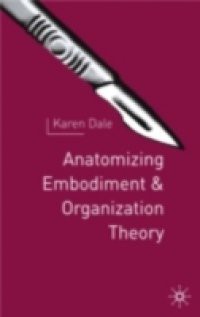Anatomising Embodiment and Organisation Theory explores the relationship between the human body and the development of social theory about organisations and organising. The human body has become a key issue in the social sciences and humanities over the last two decades, yet organisation studies has been extremely slow to recognise the significance of issues of embodiment to the relationship between people and organisations. Karen Dale argues here that, although the body is rarely considered explicitly, organisation studies is riddled with implicit assumptions about the nature of the body which have critically shaped its course. Central questions such as what definition of `organisation' is used and what research is legitimated as part of the field are seen as having been shaped by historically dominant conceptions of the body. This pre-eminent model is governed by anatomy and dissection, wherein the body is objectified, denatured and split into its component parts. It is within this perspective, which relies on the analysis of structure and function from fixed, anatomised segments, that the ongoing interplay between `organ' and `organisation' can be discerned and which works itself out across organisation studies as a form of `objectified disembodiment'.The two key symbols are the scalpel and the mirror. The scalpel is the central tool for the fragmentation of the body, but the mirror also plays a major part in the way that this invasive knowledge is reorganised as it comes to form an important element in conceptions of self-hood and embodied experience. Bringing together insights from Foucault and Merleau-Ponty, Karen Dale develops a position of `embodied subjectivity' by critiquing the approach of `objectified disembodiment' where the processes of division are centred on both the creation of the dominant and the marginalisation of that which is different. She suggests that social processes of reproduction are conflated with mechanical reproduction - the production of the same - as in mass production, leading to a discipline where there are many marginalised bodies and identities, including gender, ethnicity and disability.

